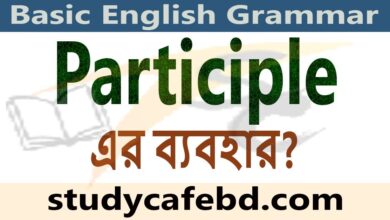Pronoun কাকে বলে ও কত প্রকার এবং Pronoun এর ব্যবহার?
Pronoun কাকে বলে কত প্রকার ও কি কি এবং Pronoun এর ব্যবহার?
Noun এর পরিবর্তে যে word বসে তাকে Pronoun বলে।
যেমন:
- I, we, you, he. she, it, they etc.
More Definition of Pronoun
A word used instead of a noun is called a pronoun.
– J.C. Nesfield.
Pronoun is used in stead of a noun.
-Dr. Sazzad Hossain.
Pronoun কত প্রকার ও কি কি?
Pronoun আট প্রকার।
যথাঃ
- Personal Pronoun
- Demonstrative Pronoun
- Interrogative Pronoun
- Relative Pronoun
- Indefinite Pronoun
- Reflexive and Emphatic Pronoun
- Reciprocal Pronoun
- Distributive Pronoun
Personal Pronoun কাকে বলে?
যে Pronoun কোন ব্যক্তি বা বস্তুর পরিবর্তে বসে তাকে Personal Pronoun বলে।
যেমনঃ
- We he, us, her, mine. him. etc.
✔️Nominative case বাক্যের Subject হিসেবে বসে।
যেমনঃ
- He goes to market.
- They are students.
✔️Objective case বাক্যের Object হিসেবে বসে।
যেমনঃ
- He gave me a pen.
- I gave him a book.
✔️Possessive case সর্বদা Noun এর আগে বসে।
যেমনঃ
- He is my father.
- My father is a teacher.
✔️Double possessive case এর পরে Noun বসে না।
যেমনঃ
- This book is mine.
- This car is ours.
Treble possessive case কাকে বলে?
Double possessive এর আগে of বসিয়ে যে possessive গঠন করা হয়, তাকে Treble possessive case বলে ।
যেমনঃ
- This book is mine.
এটা আমার বই (Double possessive case)
- This is a book of mine.
এটা আমার একটা বই (Treble possessive case)
ব্যাখ্যাঃ i নং বাক্যে মনে হয় বক্তার একটি বই আছে। অথচ ii নং বাক্যে মনে হয় বক্তার একের অধিক বই আছে গুলোর মধ্যে একটি।
Note:
- A picture of Hasan
হাসানের নিজের ছবি
- A picture of Hasan’s
হাসানের কাছে যেসব ছবি আছে তাদের মধ্যে একটি।
- The news of Hasan
হাসান সম্বন্ধে কোন সংবাদ ।
- The news of Hasan’s
হাসানের দেওয়া সংবাদ।
Demonstrative Pronoun কাকে বলে?
যে Pronoun কোন ব্যক্তি বা বস্তুর পরিবর্তে বসে একে নির্দেশ করে তাকে Demonstrative Pronoun বলে।
যেমনঃ
- This, that, these, those, so, such, one, ones, etc.
This এবং These কাছের ব্যক্তি বা বস্তুকে বুঝায় । This singular এবং These plural.
That এবং Those দূরের বস্তুকে বুঝায়। That Singular এবং Those plural.
More examples:
- This is my pen.
- These are my pens.
- That is my book.
- Those are my books.
Interrogative Pronoun কাকে বলে?
যে Pronoun দ্বারা কোন কিছুর সম্পর্কে জানতে চাওয়া হয় বা প্রশ্ন করা হয় তাকে Interrogative Pronoun বলে ।
যেমন:
- What do you want?
- Who are you?
Relative Pronoun কাকে বলে?
যে Pronoun কোন Noun বা Pronoun এর পরে বসে ঐ Noun বা Pronoun কে নির্দেশ করে এবং Conjunction এর ন্যায় দুটি sentence কে যুক্ত করে তাকে Relative Pronoun বলে ।
যেমনঃ
- I met Hasan, He is a doctor.
- I met Hasan who is a doctor.
Note: Relative Pronoun যে Noun বা Pronoun এর পরিবর্তে বসে তাকে Antecedent বলে।
Antecedent এর ঠিক পরে Relative Pronoun বসে।
Some examples of Antecedent
Who – যে/ যিনি/ যারা (ব্যক্তির পরিবর্তে বসে)।
The man who came here yesterday is my brother
যে লোকটি গতকাল এখানে এসেছিল সে আমার ভাই।
I know the man who lost his bag
যে লোকটি ব্যাগ হারিয়েছিল তাকে আমি চিনি।
I know the man who came here
যে লোকটি এখানে এসেছিল আমি তাকে চিনি।
This is the man who is a poet
ইনি হচ্ছেন সেই লোক যিনি একজন কবি।
Whom- যাকে/ যার/ (ব্যক্তির পরিবর্তে বসে)
The man whom I met yesterday is my friend
যার সাথে আমি গতকাল দেখা করেছিলাম সে আমার বন্ধু।
This is the boy whom I saw yesterday
এই হচ্ছে সেই ছেলেটি যাকে আমি গতকাল দেখেছিলাম ।
This is the man whom I helped
এই হচ্ছে সেই লোকটি যাকে আমি সাহায্য করেছিলাম।
This is my teacher whom I respect deeply
ইনি হচ্ছেন আমার শিক্ষক যাকে আমি গভীরভাবে শ্রদ্ধা করি।
Whose- যার/ যাদের (ব্যক্তির পরিবর্তে বসে)।
This is the boy whose father is dead
এই হচ্ছে সেই বালক যার বাবা মৃত
This is the boy whose mother is a teacher
এই হচ্ছে সেই বালক যার মা একজন শিক্ষক।
This is the boy whose brother is a player
এই হচ্ছে সেই বালক যার ভাই একজন খেলোয়াড়।
This is the boy whose sister is a singer
এই হচ্ছে সেই বালক যার বোন একজন গায়িকা। What- যা/ যাহা
What- যা/ যাহা (বস্তুর পরিবর্তে বসে)।
What is done is done
যা হবার হয়েছে
I know what he wants
আমি জানি সে কি চায়।
I know what he will say
আমি জানি সে কি বলবে।
I know what you read
আমি জানি তুমি কি পড়।
Which- যা/ যেটি (বস্তু, ইতর প্রাণী এবং শিশুদের পরিবর্তে বসে।
This is the baby which is sleeping
এই বালকটি যে ঘুমাচ্ছে।
The bag which I lost was black
যে ব্যাগটি আমি হারিয়েছিলাম সেটি কাল।
The book which has been bought is thrilling
যে বইটি কেনা হয়েছে সেটি রোমাঞ্চকর।
We have a cow which gives us milk
আমাদের একটি গাভী আছে যেটি আমাদের দুধ দেয়।
That-যা (ব্যক্তি বা বস্তু উভয়ের পরিবর্তে বসে)।
I have lost the book that you gave me
তুমি যে বইটি আমাকে দিয়েছিলে সেটি আমি হারিয়ে ফেলেছি।
This is the car that I bought last month
এই গাড়িটি যেটি আমি গতমাসে কিনেছিলাম।
This is the man that I met yesterday
এই লোকটি যার সাথে আমি গতমাসে দেখা করেছিলাম।
She is the best girl that I have ever seen
আমার দেখা সে সবচেয়ে ভাল মেয়ে ।
Indefinite Pronoun কাকে বলে?
যে Pronoun দ্বারা কোন অনির্দিষ্ট ব্যক্তি বা বস্তুকে বুঝায় তাকে Indefinite Pronoun বলে।
যেমনঃ :
- One, every, any, all, none, both, someone, everyone, nobody, no one, etc.
Examples:
Nobody knows il
কেউ ইহা জানে না।
No one can do it
কেউ ইহা করতে পারে না।
Everybody is not guilty
সবাই দোষী নয়।
Nobody knows me
কেউ আমাকে চিনে না।
Everybody hates him
সবাই তাকে ঘৃনা করে।
Nobody will support you
কেউ তোমাকে সমর্থন করবে না
Anybody can do it
যে কেউ ইহা করতে পারে।
One of my friends is a teacher
আমার এক বন্ধু শিক্ষক।
One of the students is absent
একজন ছাত্র অনুপস্থিত।
One must obey one’s parents
পিতা-মাতাকে সম্মান করতে হবে।
Everybody should be sincere
সবারই আন্তরিক হওয়া উচিত।
Somebody may come
কেউ কেউ আসতে পারে।
Both of them are students
তারা উভয়ই ছাত্র।
Everyone will come timely
প্রত্যেকে সময় মত।
All are not innocent
সবাই নিরপরাধ না।
Some are genius
কেউ কেউ মেধাবী।
Some are immortal
কেউ কেউ অমর।
Both of them are guilty
তারা উভয়ই অপরাধী।
One must know how to behave well
একজনকে ভাল ব্যবহার জানতে হবে।
One should not neglect the poor
গরীবদের অবহেলা করা উচিত নয়।
Reflexive and Emphatic Pronoun কাকে বলে?
Self বা selves যুক্ত Pronoun, যখন কোন object এর স্থান গ্রহণ করে এবং পশ্চাতে ফিরে পুনরায় subject কে নির্দেশ করে, তখন তাকে Reflexive and Emphatic Pronoun বলে।
একবচনের সাথে Self যুক্ত হয় এবং বহু বচনের সাথে selves যুক্ত হয়।
যেমনঃ
- My + self= Myself
- Them + selves= Themselves
- Him + self Himself.
- Your + self Yourself ( এক বচন) Your + selves=Yourselves (বহু বচন)
Examples:
- He himself is optimistic
সে নিজেই আশাবাদী।
- I myself am busy
আমি নিজেই ব্যস্ত।
- He killed himself
তিনি আত্মহত্যা করলেন ।
- I myself will go there
আমি নিজেই সেখানে যাব।
Reciprocal Pronoun কাকে বলে?
যে Pronoun দ্বারা দুই বা ততোধিক ব্যক্তি, বস্তু বা প্রাণীর মধ্যে সম্পর্ক বুঝায়, তাকে Reciprocal Pronoun বলে।
✔️each other, One another দুইয়ের মধ্যে each other এবং দুইয়ের অধিক বুঝালে One another বসে।
Note: আধুনিক পণ্ডিতগণের মতে সব জায়গায় each other বসানো যায়।
- They quarrel one another
তারা একে অপরের সাথে ঝগড়া করে।
- They used to fight one another
ভারা একে অন্যের সাথে যুদ্ধ করত।
- Two sisters help each other
দুই বোন একে অপরকে সাহায্য করে।
- Rahim and karim help each other
রহিম এবং করিম একে অপরকে সাহায্য করে ।
Distributive Pronoun কাকে বলে?
যে Pronoun দ্বারা দুই বা ততোধিক ব্যক্তি বা বস্তুর প্রত্যেকটিকে আলাদা বা পৃথকভাবে বুঝায়, তাকে Distributive Pronoun বলে।
যেমন : Each either, neither, every, everyone, etc.
- Each of the boys has a pen.
- Each of the sentences is correct.





